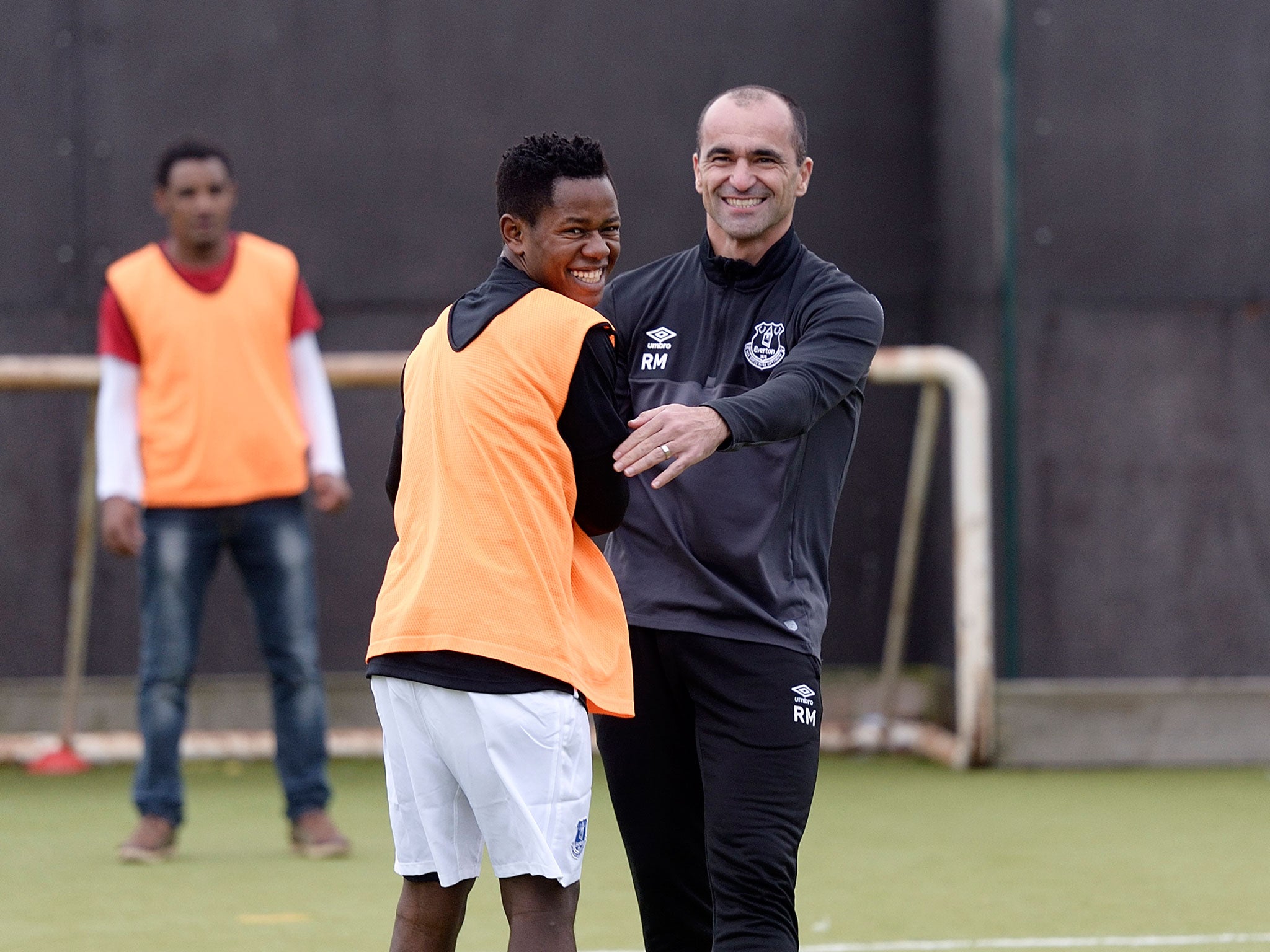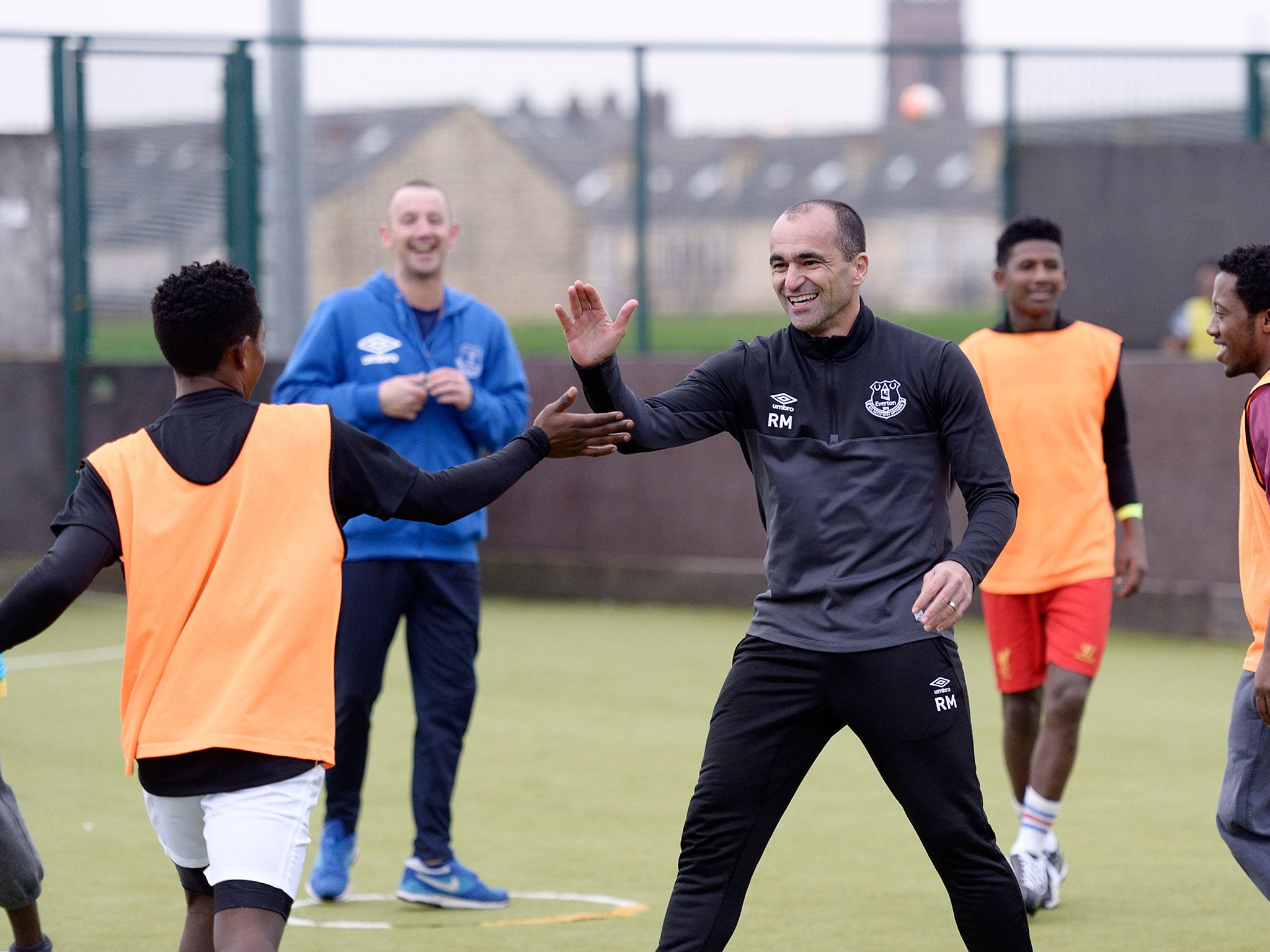The Independent's journalism is supported by our readers. When you purchase through links on our site, we may earn commission.
How a tale of Everton and one Kenyan refugee brings home the human side of English football
Electrocuted, scarred and then rescued by Everton, Jacob Vieira is one refugee among many to have been taken in by the Premier League's top clubs

Your support helps us to tell the story
From reproductive rights to climate change to Big Tech, The Independent is on the ground when the story is developing. Whether it's investigating the financials of Elon Musk's pro-Trump PAC or producing our latest documentary, 'The A Word', which shines a light on the American women fighting for reproductive rights, we know how important it is to parse out the facts from the messaging.
At such a critical moment in US history, we need reporters on the ground. Your donation allows us to keep sending journalists to speak to both sides of the story.
The Independent is trusted by Americans across the entire political spectrum. And unlike many other quality news outlets, we choose not to lock Americans out of our reporting and analysis with paywalls. We believe quality journalism should be available to everyone, paid for by those who can afford it.
Your support makes all the difference.Jacob Vieira’s roll neck top does not obscure the pronounced scarring to his neck and it soon emerges that his forearms are equally disfigured.
This was the consequence, he says, of him avoiding what the drug gangs can demand of elite young footballers in the capital of his native Kenya: ferry narcotics across the border on the team coach when they’re playing in neighbouring Tanzania.
Vieira gave the dealer who approached him in Nairobi the slip by providing a wrong departure date for the Kenyan national youth team’s trip out the country. A few weeks later, the player arrived at his own front door and discovered, on trying to open it, that it had been rigged up to a high voltage electrical current. He was electrocuted, rendered unconscious and much of the skin on his face was burned off.
It was in this state that he arrived for a pre-appointed trial with Newcastle United in August 2014. So startled were the coaches at the club’s Academy after hearing his story that they urged him seek asylum here. Two and a half years later and now 21, Vieira is still trying to convince the British authorities that a return home risks more serious injury. An individual within the British asylum appeal system is not permitted to work or study, though, so all hope of joining Newcastle, or any other side, has been put on hold.
The Home Office says it refuses to discuss individual cases but Vieira seems to have been treated with the suspicion which pervades many western countries where those seeking asylum are concerned. He says the Home Office have told him to demonstrate he is high profile enough to be at risk if he returns. Since he played for Kenyan Premier League side Muhoroni Youth FC before Newcastle paid for his flight to Britain, he thought that newspaper cuttings would be enough. Not so. He is still mired in the appeal system.

Nowhere in the midst of this on-going struggle did Jacob, who is now 21, think he would form a deep attachment to a Premier League football club. But after being held in the Harmondsworth Detention Centre in west London, he happened to be dispersed to the city of Liverpool while his case for asylum was considered. It is there he has come into contact with Everton, the club who have arguably done more than any in Britain to provide sanctuary and activity for refugees and asylum seekers.
The club’s weekly coaching session for them, run by Everton in the Community in the local Kensington district, has helped more than 250 people from around 25 countries – predominantly those worst affected by conflict in the Middle East. A total of 59 Sudanese, 10 Iraqis, 19 Ethiopians and 74 Eritreans have been welcomed through the club’s doors and they have not been the only beneficiaries. Local young players have been keen to play matches against them, helping remove potential race-related suspicion. “It helps remove suspicions and the ‘I don’t want you here. You’re the refugees’ mindset,” says Lee Johnson, the Everton in the Community support worker who has done much to make this project, funded by Liverpool City Council, a success. Vieira's initial contact with the club came when a local scout saw him and recommended him to the club as a trialist.

It seems a supreme example of football’s potential to celebrate refugee footballers, which Amnesty International is highlighting this weekend with the 80th anniversary of the arrival of Spanish Civil War child refugees to the UK who later went on to become professional footballers here. Everton are one of more than 20 clubs - also including Leicester City, Hull City, Southampton, Brentford and Notts County - to show their solidarity and support for refugees on Amnesty’s Football Welcomes weekend. Both Leicester and Hull are organising a game for refugees participating in its community scheme.
It is the release from the isolation of the asylum seeker’s no-man’s-land which seems to have been the biggest help for Vieira. “I’m not allowed to work or go to college and I’m only allowed to play football for local amateur teams,” he says. “You can feel isolated and on the outside.” The project has allowed him to work on a Level 1 coaching badge while in this state of limbo, as well as study mental health and work on the Premier League’s ‘employability’ qualification.
“You feel that people don’t want to believe anything you say when you are in this process,” he says. “I provided all of the evidence of why I arrived so scarred. I’d never thought of this asylum thing until the coaches I first met saw how I felt about going back and suggested it. Everton have been willing to give me a place to be and see me as an individual.”
One of the Everton project’s students was given a trial at Nottingham Forest after he had been granted leave to remain here and Vieira, who describes himself as a utility player, struck up a strong rapport with the former Everton manager Roberto Martinez, when he visited the weekly coaching session in 2015. “I’ve trained with Tom Davies at the Academy and you could see that he’s special,” Vieira says. “I want to prove to a club that I am too.”
Join our commenting forum
Join thought-provoking conversations, follow other Independent readers and see their replies
Comments